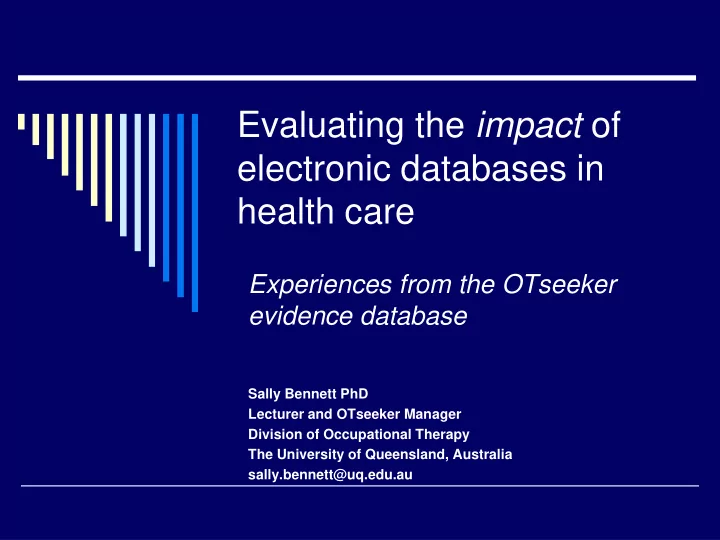

Evaluating the impact of electronic databases in health care Experiences from the OTseeker evidence database Sally Bennett PhD Lecturer and OTseeker Manager Division of Occupational Therapy The University of Queensland, Australia sally.bennett@uq.edu.au
Aims � Background to evaluation of information services � Evaluating impact � Evaluating the impact of electronic databases: the example of the OTseeker database
Why evaluate? Purpose for evaluating information services: � ‘justifying the library’s existence and providing evidence of cost benefit to the organisation.’ � ‘to improve the service’ � ‘to determine the effectiveness of services for facilitating learning and decision making.’
Evaluation of Impact � The ability of a service to make a difference in behaviour or outcome (Marshall, 2007) � Impact = ‘making a difference’ (Cullen & Esson, 2007)
Evaluating the impact of electronic databases in the health sector � Assumption: Provision of information in electronic databases makes a difference � Need to consider: Difference to whom? � Difference to what?
Difference to whom? � Users: � Students � Health professionals � Health systems � Researchers � Patients
Difference to what? � Efficiency � Cost effectiveness � Satisfaction � Knowledge � Confidence � Behaviours � Patient health outcomes (morbidity, mortality)
How to measure differences? � Web log analysis � Surveys � Qualitative research � Randomised controlled trials
The route from research information to patient health outcomes Databases Access ? Clinician’s use of database Time & Skills? Research Information Quality? Clinician’s interpretation of information Time & Skills? Clinician’s use of information Applicable? Resources? Patient’s behaviour Values? Context? Patient outcomes !!
Impact of research information on health outcomes Often patients only get 10% of the benefit from research findings because of “leakage along the information pipeline” (Glasziou & Haynes, 2005)
Some Solutions… � Address accessibility of databases � Filter the research results before they are passed on to health professionals � Databases of pre-appraised quality research
Example: OTseeker Occupational Therapy Systematic Evaluation of Evidence � Bibliographic database of over 6000 randomised controlled trials and systematic reviews relevant to occupational therapy � Free access www.otseeker.com � Since 2003: Over 1 million visits in 100+ countries
Aim of OTseeker To support evidence based-practice by reducing the time it takes to locate and critically appraise research relevant to the effectiveness of occupational therapy interventions
Features of OTseeker 1. Discipline specific collection of RCTs and SRS relevant to occupational therapy sourced from over 900 journals 2. Each RCT is critically appraised for internal validity and inclusion of clinically useful statistical information 3. Entries coded according to intervention and diagnostic categories relevant to occupational therapy 4. OTseeker contains associated resources and tutorials for evidence-based practice 5. Free access via the Internet.
Evaluation of OTseeker: Online survey � Aim: To investigate: � search practices of database users � views on its functionality � reported impact, if any, on their practice from using OTseeker. � Sample: Potential participants were occupational therapists with access to the Internet. A total of 953 people from over 40 countries completed the survey � Analysis: Data analysed from 498 participants who had used the database more than once
Online survey results N=498 Main reasons for using the database were for: � Education needs (31%) � Locating clinical information (27%) � Research or research synthesis (26%) � Professional development (7%) � Teaching/training (6%)
Results of online survey N=498 � 62% believed OTseeker improved their ability to locate research evidence � 19% agreed that the information had contributed to a change in their practice � Those who had not changed practice agreed use of OTseeker had: � improved their knowledge generally (38%) � helped confirm their practice (15%) � or that there was not enough research relevant to their topic of interest (19%)
Features of OTseeker associated with improved ability to locate research evidence: � Discipline-specific content � Provision of critical appraisal ratings of randomized controlled trials � Ranking presentation of search results by methodological quality
Comments from open question in online survey: “ More likely to look up information as it is quick way to find references with already appraised research articles” “Because OTSeeker is directly relevant to occupational therapy, it is a very efficient source for information” \ “Has helped focus and prioritise client goals and structure treatment sessions / programs via providing evidence-based research on effectiveness of treatments etc.” “I have become more confident in practice”
Further evaluation of OTseeker � Content analysis & web log analysis � Postal survey � Qualitative study � Independent evaluation (KPMG)
Difficulties evaluating electronic databases � Need to be realistic about the degree to which we can determine the impact of information from databases on patient outcomes � Actual behaviour change also hard to measure - easier to measure users reports of behaviour change � Survey methods limited by low response rates and type of data they can gather
Recommendations � Surveys and web log analyses useful for basic evaluation but should be complemented with other study designs � Consider qualitative research designs to understand perceptions of end-users � Consider use of RCT designs for evaluating effects of electronic databases even though very difficult to implement � When evaluating impact, clarify: � Purpose of the evaluation? � Who you are interested in making a difference to? � What the database is aimed at making a difference to?
References � Bennett, S, McKenna, K, Hoffmann, T, Tooth, L, McCluskey, A & Strong, J (2007) The value of an evidence database for occupational therapists: An international online survey. International Journal of Medical Informatics, 76 (7): 507-513. � Cullen, R & Esson, R.(2007). Assessing the impacts of information services in the health sector. Health Info Libr J 24 (Suppl 1)1-3. � Glasziou, P & Haynes, RB (2005). The paths from research to improved health outcomes, EBM,10, 4- 7. � Marsh, all, J (2007). Measuring the value and impact of health library and information services: past reflections, future possibilities. Health Info Libr J 24(Suppl1), 4-17.
Recommend
More recommend